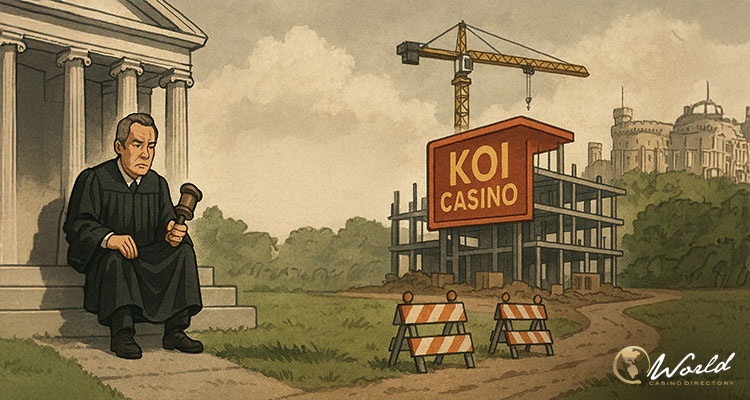The Koi Nation’s long-planned Shiloh Casino and Resort project outside Windsor has been thrown into uncertainty after a federal judge overturned the U.S. Department of the Interior’s (DOI) approval of the tribe’s land-into-trust application. The ruling, delivered by Judge Rita F. Lin of the Northern District of California, invalidates the Biden administration’s 2025 decision to place 68 acres into federal trust for the Koi, a critical step required under federal law to build a casino.
The proposed $600 million development, which envisioned a 400-room hotel and a 530,000-square-foot casino floor with 2,750 slot machines and more than 100 table games, now faces an indefinite delay as the DOI is ordered to reassess the case.
Court Finds Flaws in Approval Process
Judge Lin sharply criticized how federal officials handled the project, concluding that the DOI failed to meet consultation requirements and improperly approved the application through an official who lacked legal authority. Final approval had been issued by Bureau of Indian Education Director Tony Dearman, even though only the Senate-confirmed Secretary of the Interior, or a properly designated successor, can sign off on such decisions.
Lin determined that Dearman’s action violated federal procedure, noting the department had not shown either urgency or necessity for bypassing the established chain of command. She also found that the DOI failed to properly consult the Federated Indians of Graton Rancheria (FIGR), a neighboring tribe whose ancestral territory includes Sonoma County and that operates the Graton Casino Resort in Rohnert Park.
“DOI railroaded the (Graton) tribe at every turn,” Lin wrote in her decision, according to The Press Democrat. The judge faulted federal officials for rejecting FIGR’s repeated requests for meetings, hearings, and survey participation. Evidence presented in court showed that archaeological studies were conducted without FIGR’s involvement, and when a tribal monitor was finally permitted on-site, it was that monitor—not the DOI’s consultant—who discovered an obsidian artifact.
Dispute Over Ancestral Ties
At the center of the case was whether the Koi Nation demonstrated a sufficient historical connection to the Shiloh parcel, as required under the Indian Gaming Regulatory Act (IGRA). The tribe cited census records, historic trade routes, and accounts of a Koi chief living nearby in the early 20th century. But Judge Lin concluded the evidence did not prove the land held the “historic, economic, and cultural significance” necessary for IGRA’s restored lands provision.
“Even assuming it could be reasonably inferred that Koi tribal members occasionally worked as seasonal farm laborers on the Shiloh Parcel, seasonal labor on the land is insufficient to establish the requisite significant historical connection to the land,” Lin wrote.
FIGR and the State of California, which joined the lawsuit, argued that the government’s rushed approval ignored both preservation laws and the state’s role in reviewing new casino proposals. California officials insisted that the DOI bypassed the required “two-part determination” process, which normally involves state and local consultation and an assessment of economic and social impacts.
Reactions From Both Tribes and the Community
Greg Sarris, chairman of Graton Rancheria, called the ruling “a monumental step toward securing justice after the Biden Interior Department’s rushed, illegal rubber stamp of the Koi Nation’s proposed casino project on our ancestral tribal lands.” He added that the decision was “a landmark legal victory that all tribes with treasured historical and cultural assets should celebrate.”
The Koi Nation, however, vowed to appeal to the U.S. Court of Appeals for the Ninth Circuit. In a statement, the tribe defended the DOI’s initial decision, saying, “In our view, the government’s decision to place our land in trust was thorough, meticulous, and lawful in all respects and the record includes volumes of technical, scientific, and historical data supporting its decision. … In the end we expect justice to prevail.”
Meanwhile, local residents who had opposed the project expressed relief. Donald Ziskin, a board member of the neighborhood group Our Community Matters, said Judge Lin’s order validated their concerns about fire safety, traffic, and noise. “Everyone I’ve talked to, it’s like a burden has been lifted,” he said. “We’re still guarded, though, because of appeals and all that. But (Lin’s) decision was very thorough. She went through what we contended all along – that this decision was rushed through.”
What Comes Next
The DOI must now revisit the land-into-trust application, a process expected to involve fresh consultations with FIGR, state officials, and cultural experts. Given the legal complexities and required reviews, that reassessment could take years.
Judge Lin has directed all parties to meet on September 16 to draft a final judgment, though the dispute is far from over. With the Koi Nation preparing to challenge the ruling in appellate court, the future of the Shiloh Casino remains uncertain, leaving the project’s fate entangled in years of legal and regulatory battles.


